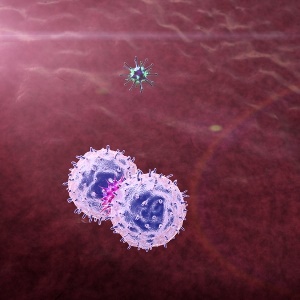
A collaboration between researchers at the University of Cape Town (UCT) and the University of Witwatersrand (Wits) has resulted in an exciting discovery, published in Nature Medicine.
This paper describes how the evolution of HIV within an infected person can drive the generation of antibodies able to neutralise HIV strains from across the world. The study has important implications for the design of a protective HIV vaccine.
Next generation sequencing technologies
Dr Colin Anthony, a Post-doctoral Researcher in the HIV Diversity group at UCT was one of the co-authors on this study, entitled: Viral variants that initiate and drive maturation of V1V2-directed HIV-1 broadly neutralising antibodies.
Read: Swarms of antibodies could control HIV
Using state of the art next generation sequencing technologies, which allow one to sequence a large portion of the viral population, Colin was able to identify how the viral population changed in response to the immune system, over four years of infection. These findings, together with data from collaborators at Wits, provided critical insight into what caused these broadly neutralising antibodies to develop, providing a strategy which may guide future HIV vaccine design.
An effective HIV-1 vaccine is likely our best hope for ending the HIV pandemic. However, attempts at achieving this have been fraught by poor results. This is partly due to the fact that the circulating HIV variants have such an exceptionally high level of diversity that, in most cases, antibodies are only able to block a very narrow range of these different variants.
Read: Antibody holds promise as weapon against HIV
A relatively rare class of antibody, termed 'broadly neutralising antibodies', are however able to block a wide range of HIV variants.
These antibodies often have unusual features and generally arise after a few years of evolving in response to the virus. Studying how these antibodies develop will hopefully help break the barrier to designing an effective HIV vaccine.
Broadly neutralising antibodies
Using state of the art technologies, including the isolation of monoclonal antibodies from single B cells and ultra-deep sequencing of shifting viral populations over nearly four years of infection, the multi-centre research team, led by Professors Penny Moore and Lynn Morris from Wits University, studied one woman who developed potent broadly neutralising antibodies.
The researchers were able to look back in time to identify the unique virus that bound the precursors of what would become the broadly neutralising antibodies, and this initiate the immune pathway to breadth.
Read: Scientists find clues to how the body fights off HIV
“The study revealed how these early antibodies evolved to become broadly neutralising. As the swarm of HIV variants struggled to evade these potent early antibodies, the virus toggled through many mutations in its surface protein. This exposed the early antibodies to a diverse range of viruses within this woman,” the researchers say.
“Some of these antibodies, exposed to such a high level of viral diversity, in turn evolved to be able to tolerate this variation. This dynamic co-evolution of the antibodies with the virus ultimately gave these antibodies the ability to neutralise diverse viruses from across the world.”
These findings provide a blueprint for the design of vaccines that can trigger the production of anti-HIV antibodies and then guide the evolution of these antibodies towards breadth in uninfected people, thus providing protection from exposure to HIV.
Read: Antibodies kill 88% of HIV types
The study was performed at the National Institute for Communicable Diseases of the National Health Laboratory Service, as part of the Centre for the AIDS Programme of Research in South Africa (CAPRISA) consortium, with long-standing collaborations with the University of Cape Town (UCT), the US NIH National Institutes for Health Vaccine Research Centre and Columbia University.
This research was funded by the South African Department of Science and Technology, the SA Medical Research Council Strategic Health Innovations Programme, the SA National Research Foundation, the Fogarty AITRP, the National Health Laboratory Service, the US National Institutes of Health and the Wellcome Trust.
Read more:




 Publications
Publications
 Partners
Partners











